初中英语牛津译林版 九年级上册 Unit 3 Teenage problems Period 3 Grammar课件(43张PPT)
文档属性
| 名称 | 初中英语牛津译林版 九年级上册 Unit 3 Teenage problems Period 3 Grammar课件(43张PPT) | 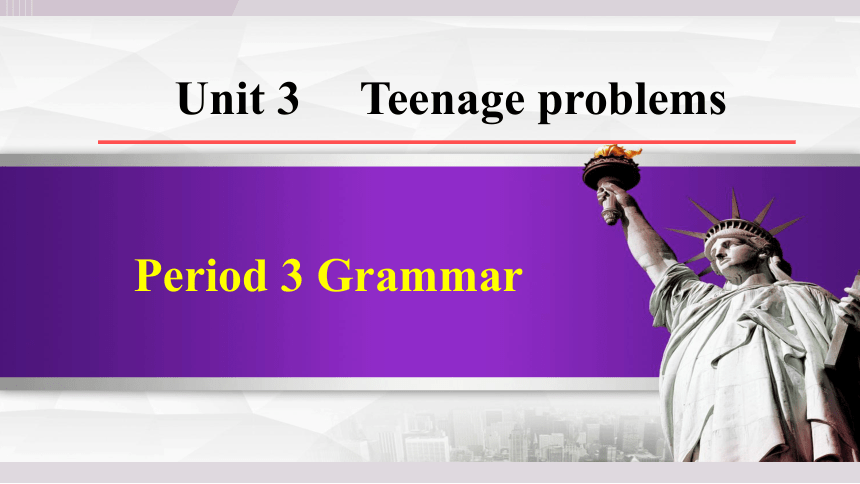 | |
| 格式 | pptx | ||
| 文件大小 | 1.4MB | ||
| 资源类型 | 教案 | ||
| 版本资源 | 牛津译林版 | ||
| 科目 | 英语 | ||
| 更新时间 | 2023-05-16 17:14:58 | ||
图片预览

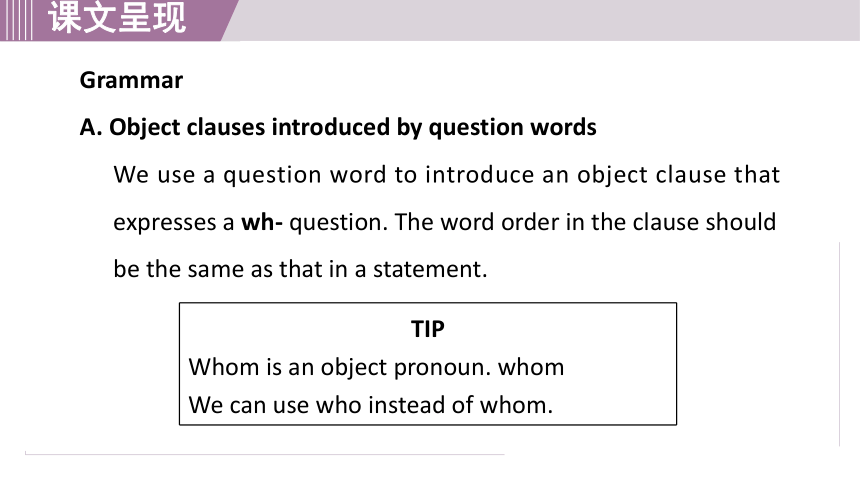
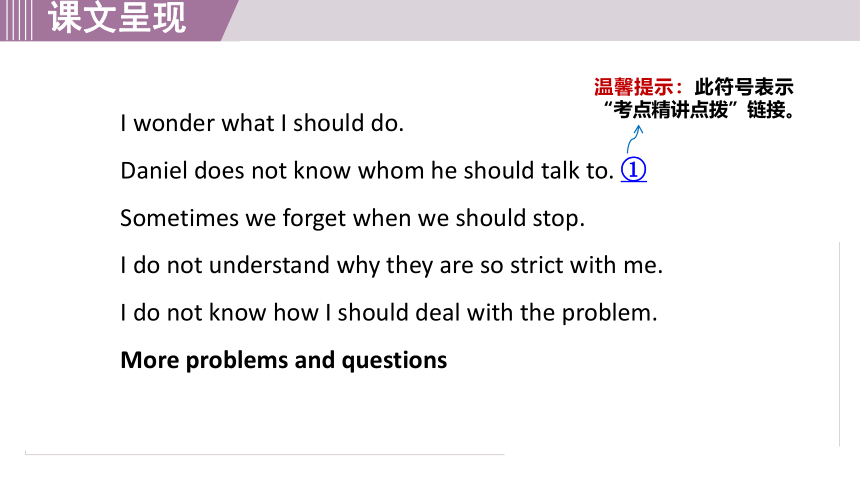
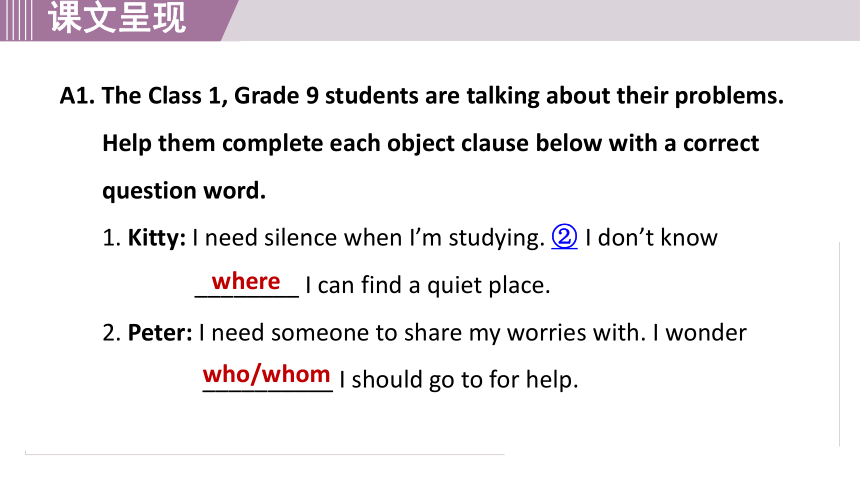
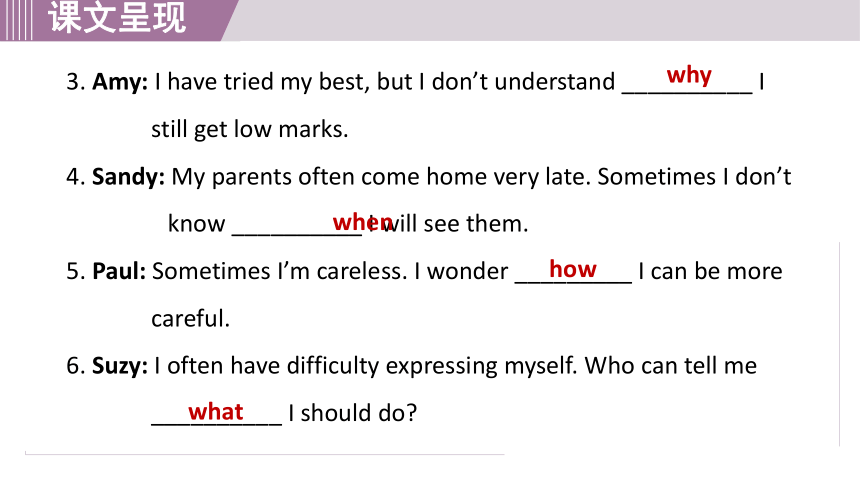
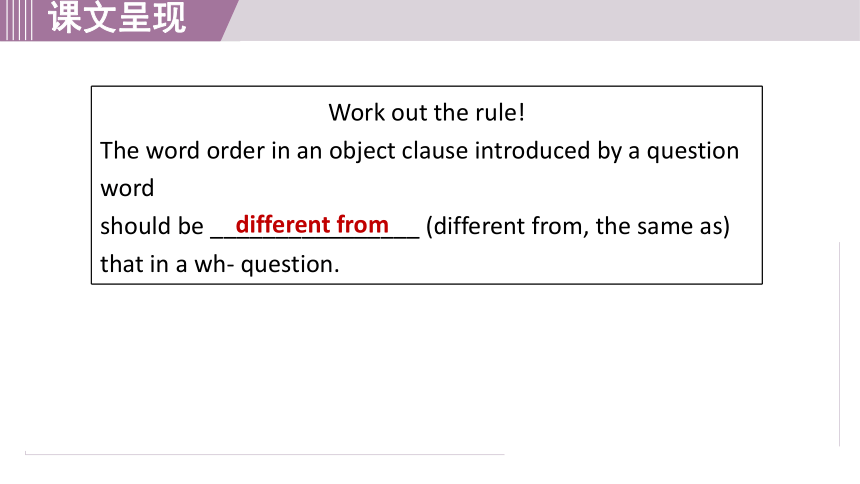
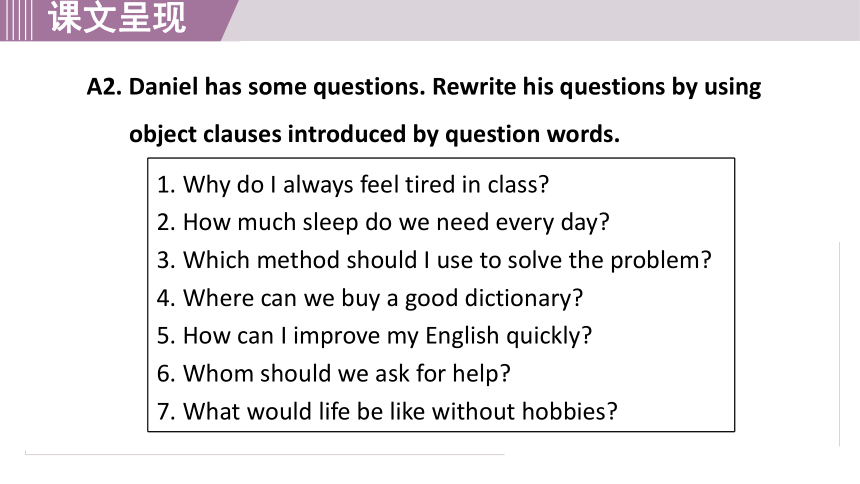
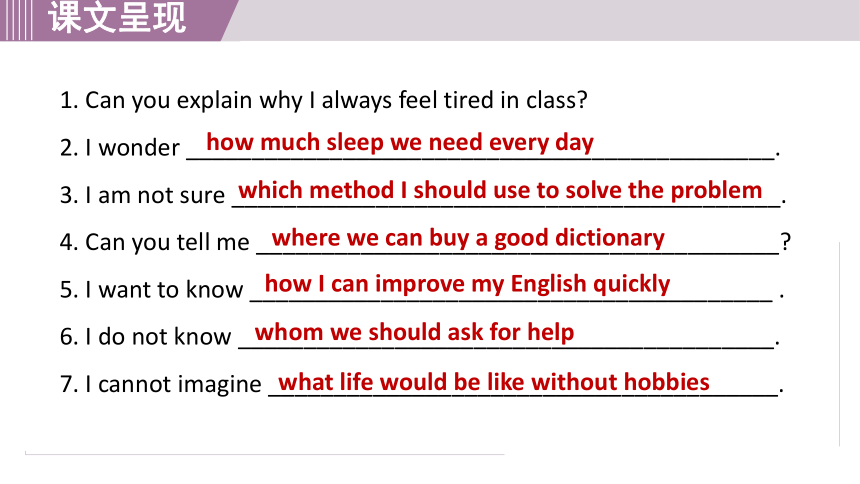
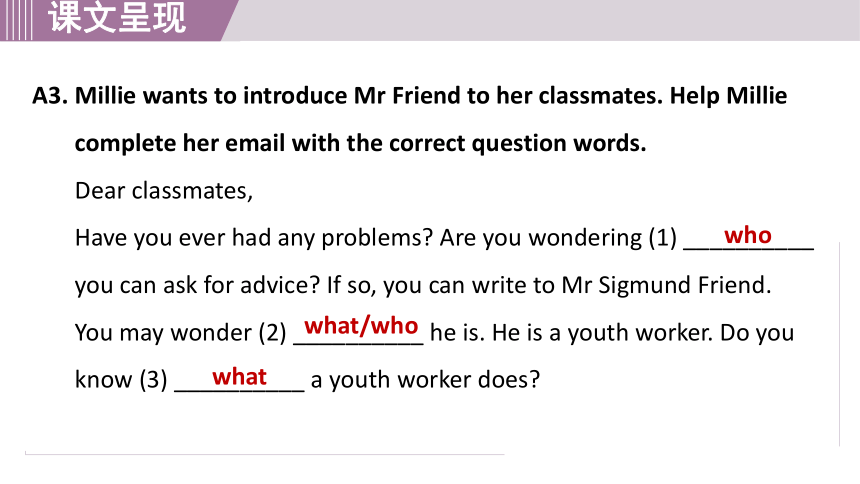
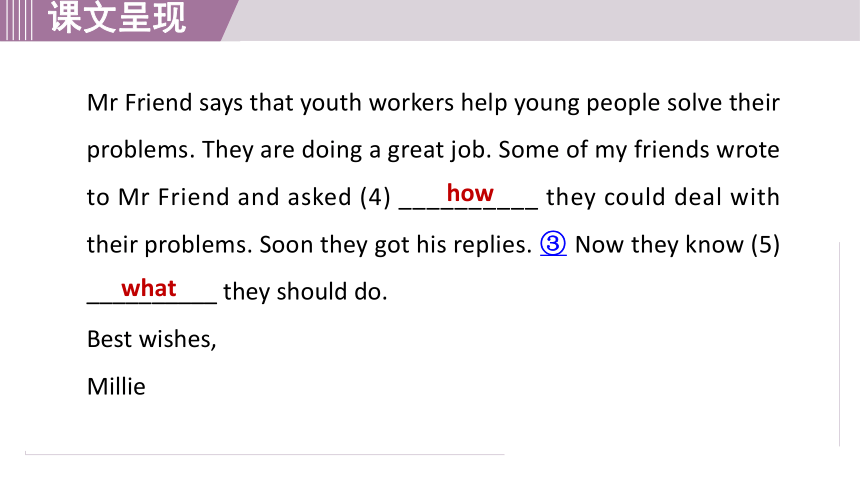
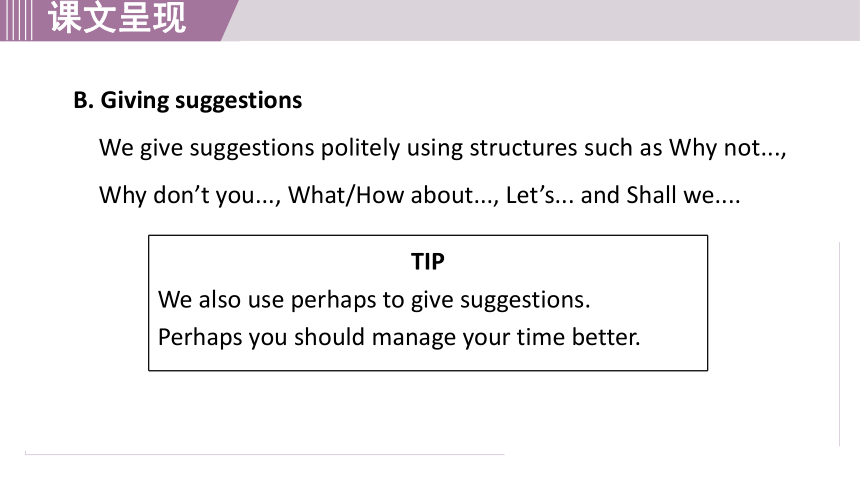
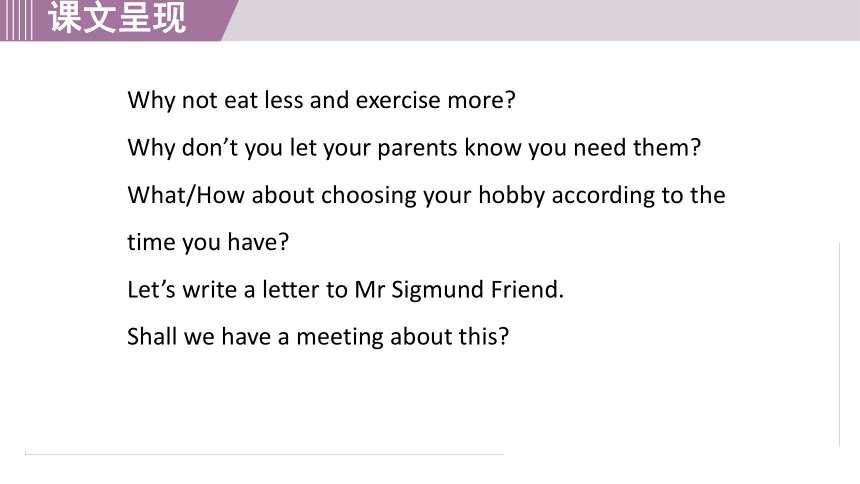
文档简介
(共43张PPT)
Period 3 Grammar
Unit 3 Teenage problems
课文呈现
Grammar
A. Object clauses introduced by question words
We use a question word to introduce an object clause that expresses a wh- question. The word order in the clause should be the same as that in a statement.
TIP
Whom is an object pronoun. whom
We can use who instead of whom.
课文呈现
I wonder what I should do.
Daniel does not know whom he should talk to. ① Sometimes we forget when we should stop.
I do not understand why they are so strict with me.
I do not know how I should deal with the problem.
More problems and questions
温馨提示:此符号表示“考点精讲点拨”链接。
课文呈现
A1. The Class 1, Grade 9 students are talking about their problems. Help them complete each object clause below with a correct question word.
1. Kitty: I need silence when I’m studying. ② I don’t know ________ I can find a quiet place.
2. Peter: I need someone to share my worries with. I wonder __________ I should go to for help.
where
who/whom
课文呈现
3. Amy: I have tried my best, but I don’t understand __________ I still get low marks.
4. Sandy: My parents often come home very late. Sometimes I don’t know __________ I will see them.
5. Paul: Sometimes I’m careless. I wonder _________ I can be more careful.
6. Suzy: I often have difficulty expressing myself. Who can tell me __________ I should do
why
when
how
what
课文呈现
Work out the rule!
The word order in an object clause introduced by a question word
should be ________________ (different from, the same as) that in a wh- question.
different from
课文呈现
A2. Daniel has some questions. Rewrite his questions by using object clauses introduced by question words.
1. Why do I always feel tired in class
2. How much sleep do we need every day
3. Which method should I use to solve the problem
4. Where can we buy a good dictionary
5. How can I improve my English quickly
6. Whom should we ask for help
7. What would life be like without hobbies
课文呈现
1. Can you explain why I always feel tired in class
2. I wonder _____________________________________________.
3. I am not sure __________________________________________.
4. Can you tell me ________________________________________
5. I want to know ________________________________________ .
6. I do not know _________________________________________.
7. I cannot imagine _______________________________________.
how much sleep we need every day
which method I should use to solve the problem
where we can buy a good dictionary
how I can improve my English quickly
whom we should ask for help
what life would be like without hobbies
课文呈现
A3. Millie wants to introduce Mr Friend to her classmates. Help Millie complete her email with the correct question words.
Dear classmates,
Have you ever had any problems Are you wondering (1) __________ you can ask for advice If so, you can write to Mr Sigmund Friend.
You may wonder (2) __________ he is. He is a youth worker. Do you know (3) __________ a youth worker does
who
what/who
what
课文呈现
Mr Friend says that youth workers help young people solve their problems. They are doing a great job. Some of my friends wrote to Mr Friend and asked (4) __________ they could deal with their problems. Soon they got his replies. ③ Now they know (5) __________ they should do.
Best wishes,
Millie
how
what
课文呈现
B. Giving suggestions
We give suggestions politely using structures such as Why not..., Why don’t you..., What/How about..., Let’s... and Shall we....
TIP
We also use perhaps to give suggestions.
Perhaps you should manage your time better.
课文呈现
Why not eat less and exercise more
Why don’t you let your parents know you need them
What/How about choosing your hobby according to the time you have
Let’s write a letter to Mr Sigmund Friend.
Shall we have a meeting about this
课文呈现
A plan to relax
Millie feels tired these days. Amy and Sandy are trying to help her. Use the correct structures to help the girls give suggestions.
Millie: I’m always feeling tired these days. There’s so much homework and I’ve spent all my time on it.
Sandy: (1) __________ do something fun
Amy: I agree. (2) __________ go to the cinema
Sandy: Good idea. But I don’t know what films are on now.
Why not
Shall we
课文呈现
Millie: I don’t want to see any films.
Amy: (3) ________________ going to the new museum My dad told me that it’s big and modern. I know where it is, but I’m not sure when it closes.
Sandy: (4) __________ go and see It’s still early.
Millie: OK. But we may get home late. (5) __________ tell our parents first.
What/How about
Why not
Let’s
课文呈现
Work out the rule!
A suggestion using _______________,_______________ , ____________________or __________ends with a question mark. A suggestion using __________ends with a full stop.
Why not...
Why don’t you...
What/How about...
Shall we...
Let’s...
①Daniel does not know whom he should talk to.
whom /hu m/ pron. 谁 (宾格)
e.g. I know who you are and whom you represent.
我知道你是谁以及你代表谁。
Who saw the thief 谁看见了那个贼?
Whom are you trying to fool 你想愚弄谁啊?
To whom is she writing 她在给谁写信?
Whom do you wait for = For whom do you wait 你在等谁?
考点1
作连接代词,是who
的宾格形式。
who 与whom :
who 与whom 都可用作疑问代词,who 是主格,whom 是宾格。
在口语中,常用who 代替whom 作宾语,但是who不能直接用在介词后面。
若直接用在介词后面,就必须用whom。who 作宾语一般用在非正式的场合。
考题1:The person ________ I just talked is Mr. Lin.
A. who B. to whose
C. to who D. to whom
D
返回
温馨提示:可返回原文
②I need silence when I’m studying.
silence /'sa l ns/ n. 安静,寂静;沉默
不可数名词,in silence 意为“沉默地”。
e.g. Most of the students were in silence in front of the strict teacher.
在那位严格的老师面前大多数学生都沉默无语。
We must learn when to speak and when to keep silent.
我们必须学会什么时候讲话,什么时候保持沉默。
考点2
考向
silent
adj. 沉默的
silently
adv. 静静地
考题2:[大连] Now more and more people like the ___________ in the countryside. (silent)
silence
返回
③Soon they got his replies.
reply /r 'pla / n. 答复,回答
e.g. Thank you for your reply. 谢谢你的回复。
He never made a reply to our question.
他从来没回复我们的问题。
考点3
reply 作名词,常用词组:
① a reply to... 对……的答复
② make a reply (to...) (对……的) 答复
辨析:reply 与answer
reply 作动词,意为“回答,答复”。比answer 正式,一般指经过思考,有针对性地回答、回复别人的问题、信件、祝贺等。reply 不能直接接宾语,要加to, 即reply to= answer。
answer 多用于“回答问题(answer the question) ”或“接电话(answer the telephone) ”等。
e.g. He replied to my letter. 他给我回了信。
Can you answer my question 你能回答我的问题吗?
一语辨异:
We are very busy. We have to not only answer the calls, but also reply to the letters.
我们非常忙碌。我们不仅要接电话,还得回信。
考题3:I’m looking forward to hearing from you. Please _______ my letter as soon as possible.
A. reply B. answer to
C. reply to D. write
C
返回
由疑问词引导的宾语从句
连接词① 连接代词(what, whom, who, whose, which) 在句中作主语、宾语、定语或表语。
连接副词(when, where, why, how) 多用来作状语。
语序 宾语从句的语序必须是陈述语序,即“连接词+ 主语+ 谓语+ 其他”。②
时态③
1 e.g. The book will show you what you must do.
这本书将会给你展示你必须做什么。
I want to know who made the toy.
我想知道是谁制作了这个玩具。
Please tell me whose book it is. 请告诉我这是谁的书。
I wonder whom you like. 我想知道你喜欢谁。
Please tell me where you are from. 请告诉我你来自哪儿。
考题1:[包头] I wasn’t sure what to write for my school project, so I asked my dad ______ I should do.
A. how B. where
C. which D. what
D
返回
2 e.g. My teacher asked me what I did yesterday.
我的老师问我昨天干什么了。
He asked me where I lived.
他问我住在哪里。
考题2:[连云港] — Could you please tell me ______
—You can take the No.2 bus.
A. when was the nearest hospital built
B. how can I get to the nearest hospital
C. when the nearest hospital was built
D. how I can get to the nearest hospital
【点拨】本题用语法判定法。句意:—你能告诉我怎样到达最近的医院吗?—你可以乘二路公交车。宾语从句要用陈述语序,排除选项A和B;又根据答语句意“你可以乘二路公交车。”可知,上句询问的是如何到达医院,故选D。
D
返回
3 含宾语从句的复合句,主、从句的时态呼应包括以下三点内容:
如果主句是一般现在时,从句可根据需要, 选用相应的任何时态。
e.g. I don’t know when he will come back.
我不知道他将何时回来。
He tells me that his sister came back yesterday.
他告诉我他姐姐昨天回来了。
考点1
如果主句是过去时,宾语从句只可根据需要选用过去时, 即一般过去时、过去进行时、过去将来时或过去完成时中的某一种时态。
e.g. The children didn’t know who he was.
孩子们不知道他是谁。
He asked his father how it had happened.
他问他父亲那件事是如何发生的。
考点2
如果宾语从句所表示的是客观事实、普遍真理等, 不管主句用什么时态,从句都用一般现在时。
e.g. The teacher said that the earth goes around the sun.
老师说过地球绕着太阳转。
考点3
考题3:[龙东] He asked me _______.
A. where can he find a supermarket
B. if I know the way to the supermarket
C. how he could get to the supermarket
【点拨】本题用语法判定法。句意:他问我怎样才能去超市。宾语从句用陈述语序,先排除A 项;主句时态是一般过去时,从句也相应地用过去时,又排除B,故选C。
C
速记小法:宾语从句用法歌诀:
宾语从句三注意,时态、语序、引导词。
主句若是过去时,主、从时态要一致;
宾从表达是真理,一般现在代过去。
引导词也不难,陈述要用that 连。
一般问句表“是否”,if 或whether 来引导。
特殊问句作宾从,疑问词引导就可以。
还有一点要说明,陈述语序要记清。
返回
提建议的句型
提建议的句型 Why not... :是Why don’t you... 的省略形式,意为“为什么不……呢?”,用来间接提出建议,后接动词原形。①
What about... =How about... :意为“(你认为) ……怎么样?”常用于征求意见、询问情况或提出建议。后接名词、代词或动名词。②
Let’s... = Let us...:意为“让我们……”,let 是动词,后面的宾语如果是代词,应用宾格,后面接动词原形。③
Shall we... :意为“我们……好吗?”后接动词原形。引起疑问以表示建议并征求对方意见。④
1 e.g. Why not ask Mr. Wu to help us
为什么不请吴老师帮助我们呢?
考题4:—A new film is on these days. ______ go to the cinema to enjoy it
—Good idea.
A. Why not B. Let’s
C. What about D. Why don’t
A
返回
2 e.g. What about a glass of milk
来一杯牛奶怎么样?
What about going out for a walk
出去散步怎么样?
考题5:[绥化] What about _______ the song Together for a Shared Future Its name is the slogan (口号) of Beijing 2022 Olympic Winter Games.
A. sing B. singing C. to sing
B
返回
3 e.g. Let’s make it a little earlier.
让我们(把时间定得) 稍早一点儿吧。
e.g. Let’s go swimming, shall we
我们去游泳,好吗?
特别提醒: 如果表示征求对方的意见,则须用其反意疑问句形式,即在句尾加上shall we(好吗)?
返回
4 e.g. Shall we climb that hill 我们爬那座小山好吗?
拓展:回答建议的表达方式:
肯定回答:Good idea. /OK. /All right. /
Yes, please./Sure./Of course./Certainly.
否定回答:I’d love to, but... /I’m afraid.../
Sorry, I can’t./No, let’s...
考题6:[荆州]—Let’s go to Mr. Yu’s speech on Chinese culture, shall we
—________ We can go next time.
A. Why not B. That’s all right.
C. Never mind. D. I’m afraid it’s too late.
D
考题7:[武威、天水] —Shall we have an outdoor graduation party after the exam
—______ I think everyone will love it.
A. Good idea. B. No way.
C. Enjoy yourself. D. The same to you.
A
返回
本节课主要学习了:
重点单词:whom , silence , worry , method , solve
重点短语:solve the problem
Period 3 Grammar
Unit 3 Teenage problems
课文呈现
Grammar
A. Object clauses introduced by question words
We use a question word to introduce an object clause that expresses a wh- question. The word order in the clause should be the same as that in a statement.
TIP
Whom is an object pronoun. whom
We can use who instead of whom.
课文呈现
I wonder what I should do.
Daniel does not know whom he should talk to. ① Sometimes we forget when we should stop.
I do not understand why they are so strict with me.
I do not know how I should deal with the problem.
More problems and questions
温馨提示:此符号表示“考点精讲点拨”链接。
课文呈现
A1. The Class 1, Grade 9 students are talking about their problems. Help them complete each object clause below with a correct question word.
1. Kitty: I need silence when I’m studying. ② I don’t know ________ I can find a quiet place.
2. Peter: I need someone to share my worries with. I wonder __________ I should go to for help.
where
who/whom
课文呈现
3. Amy: I have tried my best, but I don’t understand __________ I still get low marks.
4. Sandy: My parents often come home very late. Sometimes I don’t know __________ I will see them.
5. Paul: Sometimes I’m careless. I wonder _________ I can be more careful.
6. Suzy: I often have difficulty expressing myself. Who can tell me __________ I should do
why
when
how
what
课文呈现
Work out the rule!
The word order in an object clause introduced by a question word
should be ________________ (different from, the same as) that in a wh- question.
different from
课文呈现
A2. Daniel has some questions. Rewrite his questions by using object clauses introduced by question words.
1. Why do I always feel tired in class
2. How much sleep do we need every day
3. Which method should I use to solve the problem
4. Where can we buy a good dictionary
5. How can I improve my English quickly
6. Whom should we ask for help
7. What would life be like without hobbies
课文呈现
1. Can you explain why I always feel tired in class
2. I wonder _____________________________________________.
3. I am not sure __________________________________________.
4. Can you tell me ________________________________________
5. I want to know ________________________________________ .
6. I do not know _________________________________________.
7. I cannot imagine _______________________________________.
how much sleep we need every day
which method I should use to solve the problem
where we can buy a good dictionary
how I can improve my English quickly
whom we should ask for help
what life would be like without hobbies
课文呈现
A3. Millie wants to introduce Mr Friend to her classmates. Help Millie complete her email with the correct question words.
Dear classmates,
Have you ever had any problems Are you wondering (1) __________ you can ask for advice If so, you can write to Mr Sigmund Friend.
You may wonder (2) __________ he is. He is a youth worker. Do you know (3) __________ a youth worker does
who
what/who
what
课文呈现
Mr Friend says that youth workers help young people solve their problems. They are doing a great job. Some of my friends wrote to Mr Friend and asked (4) __________ they could deal with their problems. Soon they got his replies. ③ Now they know (5) __________ they should do.
Best wishes,
Millie
how
what
课文呈现
B. Giving suggestions
We give suggestions politely using structures such as Why not..., Why don’t you..., What/How about..., Let’s... and Shall we....
TIP
We also use perhaps to give suggestions.
Perhaps you should manage your time better.
课文呈现
Why not eat less and exercise more
Why don’t you let your parents know you need them
What/How about choosing your hobby according to the time you have
Let’s write a letter to Mr Sigmund Friend.
Shall we have a meeting about this
课文呈现
A plan to relax
Millie feels tired these days. Amy and Sandy are trying to help her. Use the correct structures to help the girls give suggestions.
Millie: I’m always feeling tired these days. There’s so much homework and I’ve spent all my time on it.
Sandy: (1) __________ do something fun
Amy: I agree. (2) __________ go to the cinema
Sandy: Good idea. But I don’t know what films are on now.
Why not
Shall we
课文呈现
Millie: I don’t want to see any films.
Amy: (3) ________________ going to the new museum My dad told me that it’s big and modern. I know where it is, but I’m not sure when it closes.
Sandy: (4) __________ go and see It’s still early.
Millie: OK. But we may get home late. (5) __________ tell our parents first.
What/How about
Why not
Let’s
课文呈现
Work out the rule!
A suggestion using _______________,_______________ , ____________________or __________ends with a question mark. A suggestion using __________ends with a full stop.
Why not...
Why don’t you...
What/How about...
Shall we...
Let’s...
①Daniel does not know whom he should talk to.
whom /hu m/ pron. 谁 (宾格)
e.g. I know who you are and whom you represent.
我知道你是谁以及你代表谁。
Who saw the thief 谁看见了那个贼?
Whom are you trying to fool 你想愚弄谁啊?
To whom is she writing 她在给谁写信?
Whom do you wait for = For whom do you wait 你在等谁?
考点1
作连接代词,是who
的宾格形式。
who 与whom :
who 与whom 都可用作疑问代词,who 是主格,whom 是宾格。
在口语中,常用who 代替whom 作宾语,但是who不能直接用在介词后面。
若直接用在介词后面,就必须用whom。who 作宾语一般用在非正式的场合。
考题1:The person ________ I just talked is Mr. Lin.
A. who B. to whose
C. to who D. to whom
D
返回
温馨提示:可返回原文
②I need silence when I’m studying.
silence /'sa l ns/ n. 安静,寂静;沉默
不可数名词,in silence 意为“沉默地”。
e.g. Most of the students were in silence in front of the strict teacher.
在那位严格的老师面前大多数学生都沉默无语。
We must learn when to speak and when to keep silent.
我们必须学会什么时候讲话,什么时候保持沉默。
考点2
考向
silent
adj. 沉默的
silently
adv. 静静地
考题2:[大连] Now more and more people like the ___________ in the countryside. (silent)
silence
返回
③Soon they got his replies.
reply /r 'pla / n. 答复,回答
e.g. Thank you for your reply. 谢谢你的回复。
He never made a reply to our question.
他从来没回复我们的问题。
考点3
reply 作名词,常用词组:
① a reply to... 对……的答复
② make a reply (to...) (对……的) 答复
辨析:reply 与answer
reply 作动词,意为“回答,答复”。比answer 正式,一般指经过思考,有针对性地回答、回复别人的问题、信件、祝贺等。reply 不能直接接宾语,要加to, 即reply to= answer。
answer 多用于“回答问题(answer the question) ”或“接电话(answer the telephone) ”等。
e.g. He replied to my letter. 他给我回了信。
Can you answer my question 你能回答我的问题吗?
一语辨异:
We are very busy. We have to not only answer the calls, but also reply to the letters.
我们非常忙碌。我们不仅要接电话,还得回信。
考题3:I’m looking forward to hearing from you. Please _______ my letter as soon as possible.
A. reply B. answer to
C. reply to D. write
C
返回
由疑问词引导的宾语从句
连接词① 连接代词(what, whom, who, whose, which) 在句中作主语、宾语、定语或表语。
连接副词(when, where, why, how) 多用来作状语。
语序 宾语从句的语序必须是陈述语序,即“连接词+ 主语+ 谓语+ 其他”。②
时态③
1 e.g. The book will show you what you must do.
这本书将会给你展示你必须做什么。
I want to know who made the toy.
我想知道是谁制作了这个玩具。
Please tell me whose book it is. 请告诉我这是谁的书。
I wonder whom you like. 我想知道你喜欢谁。
Please tell me where you are from. 请告诉我你来自哪儿。
考题1:[包头] I wasn’t sure what to write for my school project, so I asked my dad ______ I should do.
A. how B. where
C. which D. what
D
返回
2 e.g. My teacher asked me what I did yesterday.
我的老师问我昨天干什么了。
He asked me where I lived.
他问我住在哪里。
考题2:[连云港] — Could you please tell me ______
—You can take the No.2 bus.
A. when was the nearest hospital built
B. how can I get to the nearest hospital
C. when the nearest hospital was built
D. how I can get to the nearest hospital
【点拨】本题用语法判定法。句意:—你能告诉我怎样到达最近的医院吗?—你可以乘二路公交车。宾语从句要用陈述语序,排除选项A和B;又根据答语句意“你可以乘二路公交车。”可知,上句询问的是如何到达医院,故选D。
D
返回
3 含宾语从句的复合句,主、从句的时态呼应包括以下三点内容:
如果主句是一般现在时,从句可根据需要, 选用相应的任何时态。
e.g. I don’t know when he will come back.
我不知道他将何时回来。
He tells me that his sister came back yesterday.
他告诉我他姐姐昨天回来了。
考点1
如果主句是过去时,宾语从句只可根据需要选用过去时, 即一般过去时、过去进行时、过去将来时或过去完成时中的某一种时态。
e.g. The children didn’t know who he was.
孩子们不知道他是谁。
He asked his father how it had happened.
他问他父亲那件事是如何发生的。
考点2
如果宾语从句所表示的是客观事实、普遍真理等, 不管主句用什么时态,从句都用一般现在时。
e.g. The teacher said that the earth goes around the sun.
老师说过地球绕着太阳转。
考点3
考题3:[龙东] He asked me _______.
A. where can he find a supermarket
B. if I know the way to the supermarket
C. how he could get to the supermarket
【点拨】本题用语法判定法。句意:他问我怎样才能去超市。宾语从句用陈述语序,先排除A 项;主句时态是一般过去时,从句也相应地用过去时,又排除B,故选C。
C
速记小法:宾语从句用法歌诀:
宾语从句三注意,时态、语序、引导词。
主句若是过去时,主、从时态要一致;
宾从表达是真理,一般现在代过去。
引导词也不难,陈述要用that 连。
一般问句表“是否”,if 或whether 来引导。
特殊问句作宾从,疑问词引导就可以。
还有一点要说明,陈述语序要记清。
返回
提建议的句型
提建议的句型 Why not... :是Why don’t you... 的省略形式,意为“为什么不……呢?”,用来间接提出建议,后接动词原形。①
What about... =How about... :意为“(你认为) ……怎么样?”常用于征求意见、询问情况或提出建议。后接名词、代词或动名词。②
Let’s... = Let us...:意为“让我们……”,let 是动词,后面的宾语如果是代词,应用宾格,后面接动词原形。③
Shall we... :意为“我们……好吗?”后接动词原形。引起疑问以表示建议并征求对方意见。④
1 e.g. Why not ask Mr. Wu to help us
为什么不请吴老师帮助我们呢?
考题4:—A new film is on these days. ______ go to the cinema to enjoy it
—Good idea.
A. Why not B. Let’s
C. What about D. Why don’t
A
返回
2 e.g. What about a glass of milk
来一杯牛奶怎么样?
What about going out for a walk
出去散步怎么样?
考题5:[绥化] What about _______ the song Together for a Shared Future Its name is the slogan (口号) of Beijing 2022 Olympic Winter Games.
A. sing B. singing C. to sing
B
返回
3 e.g. Let’s make it a little earlier.
让我们(把时间定得) 稍早一点儿吧。
e.g. Let’s go swimming, shall we
我们去游泳,好吗?
特别提醒: 如果表示征求对方的意见,则须用其反意疑问句形式,即在句尾加上shall we(好吗)?
返回
4 e.g. Shall we climb that hill 我们爬那座小山好吗?
拓展:回答建议的表达方式:
肯定回答:Good idea. /OK. /All right. /
Yes, please./Sure./Of course./Certainly.
否定回答:I’d love to, but... /I’m afraid.../
Sorry, I can’t./No, let’s...
考题6:[荆州]—Let’s go to Mr. Yu’s speech on Chinese culture, shall we
—________ We can go next time.
A. Why not B. That’s all right.
C. Never mind. D. I’m afraid it’s too late.
D
考题7:[武威、天水] —Shall we have an outdoor graduation party after the exam
—______ I think everyone will love it.
A. Good idea. B. No way.
C. Enjoy yourself. D. The same to you.
A
返回
本节课主要学习了:
重点单词:whom , silence , worry , method , solve
重点短语:solve the problem
